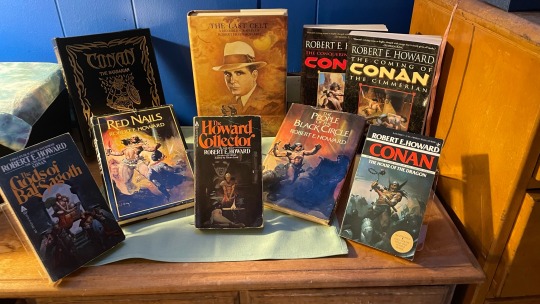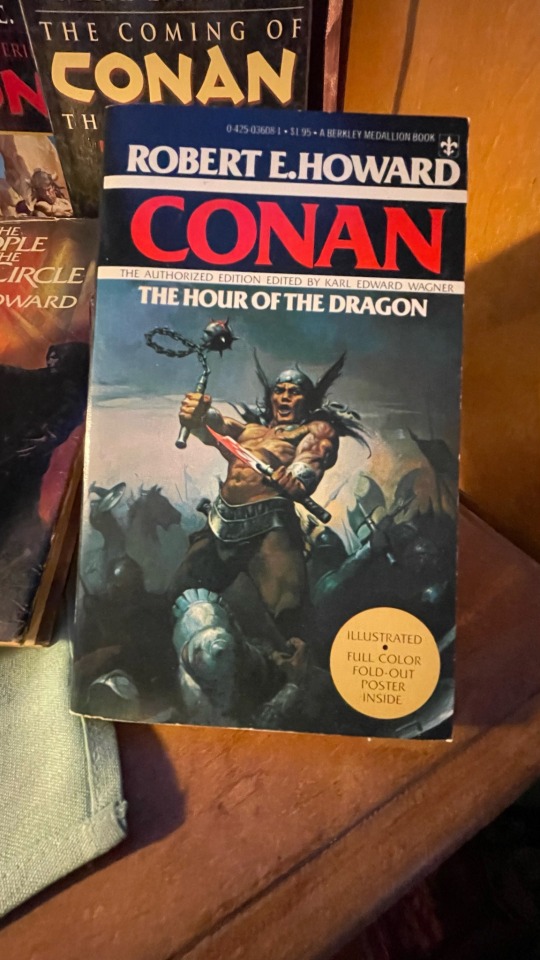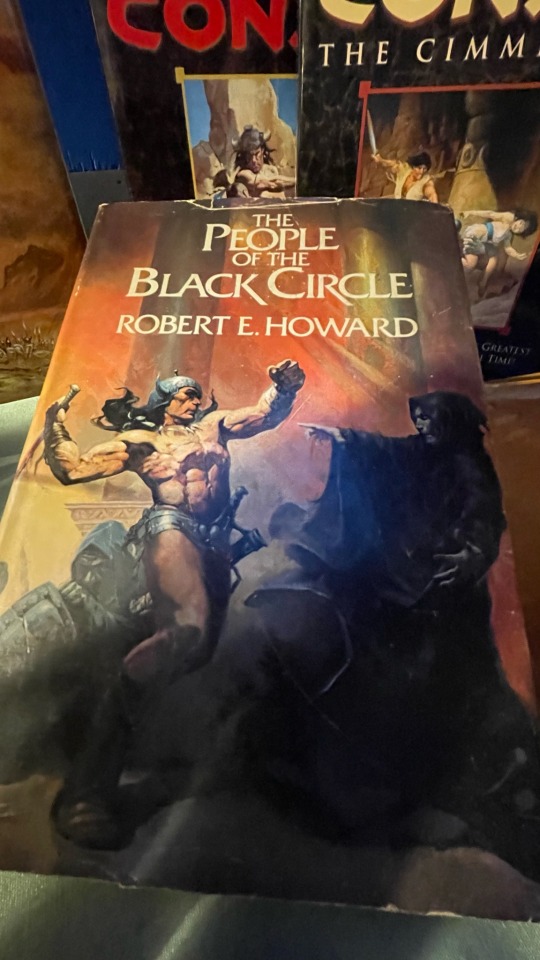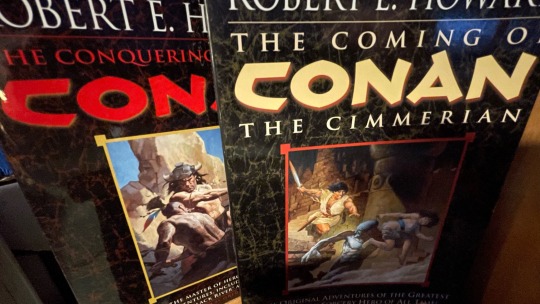#grant putnam
Text

Grant Putnam
6 notes
·
View notes
Text
"It is rather a curious thing, my young friend, but that is exactly my record. I could outlift any man in Southern Illinois when I was young, and I never was thrown [in a wrestling match]. There was a big fellow named Jack Armstrong, strong as a Russian bear, that I could not put down; nor could he get me on the ground. If George [Washington] was loafing around here now, I should be glad to have a tussle with him, and I rather believe that one of the plain people of Illinois would be able to manage the aristocrat of old Virginia."
-- Abraham Lincoln, to Illinois Judge Samuel H. Treat, after Treat shared stories he had heard from George Washington's step-grandson, George Washington Parke Custis, who had noted that Washington was one of the strongest men of his generation and also a famous wrestler who had never been thrown in a match. ("Recollections of Lincoln" by James Grant Wilson, Putnam's Magazine, February 1909)
#History#Presidents#Abraham Lincoln#President Lincoln#George Washington#President Washington#General Washington#Presidency#Presidential Personalities#Putnam's Magazine#Quotes by Presidents#Presidents About Presidents#Presidents On Presidents#Presidential Quotes
28 notes
·
View notes
Text






My Howard library
(It is meek, I know—but in time, it shall grow. Also, I have other volumes which contain Howard stories; these are just the books which are solely dedicated to Howard.)
Books (by title):
“Coming of Conan the Cimmerian, The” 2003 print by DEL REY.
“Conan the Barbarian” 2008 printing by EASTON PRESS.
“Conquering Sword of Conan, The” 2005 printing by DEL REY.
“Gods of Bal-Soggoth, The” 1979 first publication by ACE BOOKS SF.
“Hour of the Dragon” 1977 AUTHORISED EDITION by Berkley Medallion.
“Howard Collector, The” composed by Glenn Lord, 1979 print by ACE BOOKS SF.
“Last Celt, The” composed by Glenn Lord, 1976 FIRST EDITION by GRANT.
“People of the Black Circle, The” 1977 AUTHORISED EDITION by BERKLEY PUTNAM.
“Red Nails” 1977 AUTHORISED EDITION by BERKLEY PUTNAM.

Films:
“Conan: The Complete Quest” (Dir. John Milius, Richard Fleischer, 1982, 1984; blu-ray, 2016 release)
“Red Sonja” (Dir. Richard Fleischer, 1985; blu-ray, 2010 UK release)
Sidenote: The Red Sonja with which most of us know is not Howard’s Sonya, rather it is the creation of Marvel writers, Roy Thomas & Barry Smith. They took inspiration from a smaller character by Howard, Red Sonya of Rogatino, whom belonged in an entirely different age with different fiction–though had the titular red hair and flaming temperance, which the Marvel duo took and placed in Howard’s Hyborian Age, mainly to make a sexy female Conan.
#Robert E. Howard#conan the barbarian#red sonja#vintage#rare books#old books#american#sword and sorcery#science fiction
11 notes
·
View notes
Text

This mobile-friendly page is defined by my ability to write as these characters. The characters on the page are subject to change at any time.
The Accountant {Drive Angry}

FACE CLAIM: William Fichtner
AGE: Unknown
STATUS: Unknown
SEXUALITY: Fluent
OCCUPATION: Right Hand of the Devil
Q {Star Trek Universe}

FACE CLAIM: John De Lancie
AGE: ???
STATUS: Active
SEXUALITY: Yes?
OCCUPATION: Q Continuum
Harry Vanderspeigle {Resident Alien}

FACE CLAIM: Alan Tudyk
AGE: ???
STATUS: Active
SEXUALITY: Complex
OCCUPATION: Alien/Doctor/World Ender
Frik {Merlin 1998}

FACE CLAIM: Martin Short
AGE: ???
STATUS: Active
SEXUALITY: Uncertain
OCCUPATION: Fae
Morgan Le Fay {Merlin 1998}

FACE CLAIM: Helena Bonham Carter
AGE: 20s
STATUS: Active
SEXUALITY: Uncertain
OCCUPATION: Former Princess
Oliver Putnam {OMITB}

FACE CLAIM: Martin Short
AGE: 70s
STATUS: Active
SEXUALITY: Bisexually-Open
OCCUPATION: Theater Director/Murder Mystery Producer
Rupert Giles {Buffy Verse}

FACE CLAIM: Anthony Head
AGE: 50s
STATUS: Active
SEXUALITY: Uncertain-Open Minded
OCCUPATION: Librarian/Book Store Owner/Watcher
Annalee Call {Alien Resurrection.}

FACE CLAIM: Winona Ryder
AGE: 20s
STATUS: Active
SEXUALITY: Uncertain
OCCUPATION: Auton/Alien Killer
Giles Redferne {Warlock}

FACE CLAIM: Richard E. Grant
AGE: 31
STATUS: Unknown
SEXUALITY: Assumed Straight
OCCUPATION: Witch Finder/Hunter
The Vision {Marvel Universe}

FACE CLAIM: Paul Bettany
AGE: Uncertain
STATUS: MIA
SEXUALITY: Unknown
OCCUPATION: Avenger
Nathaniel Taylor {Terra Nova}

FACE CLAIM: Stephen Lang
AGE: 59
STATUS: Alive
SEXUALITY: Straight
OCCUPATION: Commander of Terra Nova
Lance Bishop {Aliens}

FACE CLAIM: Lance Henriksen
AGE: Unknown
STATUS: Presumed Deactivated
SEXUALITY: Unknown
OCCUPATION: Synthetic Technician
Norman Osborn {Marvel Universe}

FACE CLAIM: Willem Dafoe
AGE: 50s
STATUS: Presumed Dead
SEXUALITY: Unknown
OCCUPATION: Industrialist
Waldo {Into The Badlands}

FACE CLAIM: Stephen Lang
AGE: 65
STATUS: Alive
SEXUALITY: Straight
OCCUPATION: Former Regent/Advisor
The Collector {Marvel Universe}

FACE CLAIM: Benicio del Toro
AGE: Unknown
STATUS: Alive
SEXUALITY: Unknown
OCCUPATION: Collector of Species
Dr. Issacs {Resident Evil}

FACE CLAIM: Ian Glen
AGE: 50s
STATUS: Alive
SEXUALITY: Unknown
OCCUPATION: Umbrella Scientist
Ruby Knowby {Ash vs Evil Dead}

FACE CLAIM: Lucy Lawless
AGE: Unknown
STATUS: Dead/Alive/It's Complicated
SEXUALITY: Bisexual
OCCUPATION: Dark One
Johnathan Carnahan {The Mummy}

FACE CLAIM: John Hannah
AGE: Uncertain
STATUS: Alive
SEXUALITY: Straight
OCCUPATION: Entrepreneur
Kurt Wagner {X-men/X-2}

FACE CLAIM: Alan Cumming
AGE: Unknown
STATUS: Alive
SEXUALITY: Uncertain
OCCUPATION: Mutant/Circus Performer/Child of God
#harry vanderspeigle#ruby knowby#canon characters#character page#resident evil#marvel universe#horror movies#omitb rp#merlin rp#resident alien rp#alien verse#buffy verse#warlock rp#alan cumming#john hannah
2 notes
·
View notes
Text
In 1873, in the company of women's rights activists, Mary Putnam Jacobi contemplated the subordinate status of American women. Women held secondary positions because of a false, but popular, "public sentiment": reproduction superseded all other activities of the female sex. "It is so far from true," she continued, "that the bearing and rearing of children suffices to absorb the energies of the whole female sex, that a large surplus of feminine activity has always remained to be absorbed in other than these primitive directions." According to Jacobi, women had a surplus of unused energy that could be diverted from the "primitive" to the productive, and divided between the private world of home and family and the public world of higher education and professional work. Women needed to be contributing members of society, intellectually engaged, and devoted to the greater good. This was not a choice; the health of women depended on it.
For Jacobi, women's work was a matter of health, but it was also a tool of liberation, an equalizing force that could grant women financial independence and social autonomy. Work could prove women's economic and intellectual worth while granting personal freedom. Women had always worked, she said, "but they demand now, and simply, some opportunity for a free choice in the kind of work, which, apart from the care of children, they may perform." She respected all forms of work, but professional careers held a special advantage because they provided a lifetime of economic autonomy, not temporary compensation. The professions allowed women to have "separate resources" from men, meaning fathers and spouses. In marriage, they could create what she called an "equitable monetary division between husband and wife." Professional work was not indulgent; rather, it was "only the natural result of the double pressure of an economic and of a psychological necessity."
-Carla Bittel, Mary Putnam Jacobi & The Politics of Medicine in Nineteenth-Century America.
#carla bittel#Mary Putnam Jacobi#womens liberation#first wave feminism#women’s rights activism#women’s work
15 notes
·
View notes
Text
Gary Katcher Greenwich
Website: http://www.worky.com/garykatcher
Address: 411 W. Putnam Ave, Suite 220, Greenwich, CT 06830
In 2016, Gary Katcher of Greenwich, Libertas' founder, reimagined funding relationships, aiming for a more connected and supportive financial partnership for businesses. Today, after over $2.1 billion in funding, Gary Katcher of Greenwichand Libertas still reflects this commitment to serving business owners, granting them the resources and flexibility crucial for success. Gary Katcher of NY always remarked that relationships are considered a valuable asset, embodying a spirit of dedication to business growth and prosperity. Gary Katcher's vision continues to drive their approach.
#Finance#Gary Katcher Greenwich
Business Hours: Monday – Friday 9am – 6pm
LinkedIn: https://www.linkedin.com/company/libertas-funding/
Facebook: https://www.facebook.com/libertasfunding/

2 notes
·
View notes
Text
On to Round 2!
This is a wrap-up of the current standings. Polls for round 2 will be published starting this Saturday (12/16).
Congratulations to all the counties that progressed!
The state that is standing the strongest is New York, with 39 counties progressing to round 2! Albany, Allegany, Allegany, Broome, Cattaraugus, Chautauqua, Chemung, Chenango, Clinton, Columbia, Delaware, Franklin, Greene, Hamilton, Jefferson, Kings, Livingston, Nassau, New York, Niagara, Oneida, Orange, Otsego, Putnam, Rensselaer, Richmond, Rockland, Saint Lawrence, Saratoga, Schuyler, Steuben, Suffolk, Sullivan, Ulster, Warren, Washington, Wayne, Westchester, and Wyoming.
Next most powerful state is Virginia, which has 36 winning counties. Alleghany, Alleghany, Amherst, Augusta, Bedford, Brunswick, Caroline, Carroll, Charlotte, Chesterfield, Fairfax, Fauquier, Fluvanna, Gloucester, Goochland, Grayson, Halifax, Isle of Wight, James City, King and Queen, King George, King William, Lee, Louisa, Montgomery, Patrick, Pittsylvania, Prince Edward, Pulaski, Rockingham, Scott, Smyth, Southampton, Tazewell, Warren, and Wise.
Ohio is also standing strong with 27 advancing counties. Brown, Butler, Columbiana, Coshocton, Crawford, Defiance, Erie, Fulton, Geauga, Holmes, Jackson, Lake, Lawrence, Licking, Madison, Mahoning, Medina, Mercer, Monroe, Muskingum, Perry, Pickaway, Ross, Scioto, Seneca, Trumbull, and Van Wert.
North Carolina is up next with a solid 24 wins. Beaufort, Cabarrus, Caldwell, Camden, Carteret, Craven, Currituck, Granville, Harnett, Henderson, Hoke, Jackson, Johnson, Lenoir, Lincoln, Macon, Madison, Mecklenburg, Northampton, Onslow, Person, Robeson, Tyrrell, and Wake.
Only 1 more state has over 20 counties that made won their match-ups and that's my wonderful Washington. Adams, Asotin, Chelan, Clallam, Cowlitz, Ferry, Garfield, Grant, Grays Harbor, King, Kitsap, Kittitas, Klickitat, Lewis, Pacific, Pend Oreille, Skagit, Snohomish, Thurston, Walla Walla, Whatcom, Whitman, Yakima. Stay strong my soldiers.
A much higher number of states are comfortably in the middle of the pack. They are as follows:
Texas: 19 counties. Bosque, Collin, Dallas, Denton, Fort Bend, Goliad, Hockley, Jones, Lipscomb, Live Oak, Llano, McMullen, Milam, Ochiltree, Orange, Panola, Parker, San Patricio, and Travis.
California: 17 counties. Amador, Calaveras, El Dorado, Imperial, Lake, Mariposa, Monterey, Orange, San Benito, San Luis Obispo, Santa Barbara, Santa Clara, Santa Cruz, Solano, Tulare, Tuolumne, and Yolo.
Pennsylvania: 16 counties. Allegheny, Blair, Butler, Carbon, Dauphin, Franklin, Greene, Jefferson, Lancaster, Lycoming, Mifflin, Montgomery, Perry, Potter, Venango, and York.
Tennessee: 15 counties. Blount, Campbell, Carter, Cumberland, Hardin, Houston, Johnson, Knox, Madison, Maury, McNairy, Obion, Union, Williamson, and Wilson.
Nebraska: 13 counties. Adams, Buffalo, Cass, Cherry, Dakota, Keith, Knox, Nuckolls, Platte, Saunders, Stanton, Thayer, and Webster.
Nevada: 13 counties. Churchill, Clark, Douglas, Esmeralda, Eureka, Lander, Lincoln, Lyon, Mineral, Pershing, Storey, Washoe, and White Pine.
Illinois: 12 counties. Cook, DeKalb, Franklin, Jasper, Kane, Marion, McDonough, McHenry, Morgan, Peoria, St Clair, and Winnebago.
Maryland: 12 counties. Anne Arundel, Calvert, Carroll, Cecil, Dorchester, Frederick, Montgomery, Prince George’s, Queen Anne’s, Talbot, Washington, and Worcester.
Michigan: 12 counties. Barry, Berrien, Clinton, Genesee, Gogebic, Kalamazoo, Lake, Oceana, Ottawa, Rocommon, Sanilac, and Wexford.
Iowa: 11 counties. Dickinson, Fayette, Hancock, Hardin, Henry, Humboldt, Jefferson, Jones, Polk, Pottawattamie, and Wright.
Louisiana: 11 parishes. Ascension, Bossier, Cameron, Catahoula, Concordia, Jefferson, Lincoln, Natchitoches, St Bernard, St James, and St Tammany.
New Jersey: 11 counties. Bergen, Cumberland, Essex, Middlesex, Morris, Passaic, Salem, Somerset, Sussex, Union, and Warren.
Kentucky: 10 counties. Boone, Boyle, Breckinridge, Daviess, Leslie, Logan, Pike, Shelby, Trimble, Woodford.
Many of these poor cute states are barely hanging on. Please wish them luck.
Florida: 8 counties. Alachua, Bay, Miami-Dade, Monroe, Okaloosa, Osceola, Palm Beach, and St Johns.
New Mexico: 8 counties. Colfax, Curry, Doña Ana, Lincoln, Mora, Otero, Roosevelt, and Socorro.
Georgia: 6 counties. Bartow, Cherokee, Floyd, Fulton, Pierce, and Rockdale.
Indiana: 6 counties. Benton, Elkhart, Jennings, Marion, Marshall, and Starke.
Minnesota: 6 counties. Aitkin, Clearwater, Hennepin, Hubbard, McLeod, and Pipestone.
Wisconsin: 6 counties. Calumet, Fond du Lac, Osaukee, Portage, Racine, and Sheboygan.
Wyoming: 6 counties. Big Horn, Converse, Lincoln, Natrona, Park, and Teton.
Missouri: 5 counties. Clay, Gentry, Greene, Newton, and St Louis.
South Carolina: 5 counties. Anderson, Calhoun, Dillon, Dorchester, and Lexington.
Utah: 5 counties. Beaver, Summit, Utah, Washington, and Wayne.
Alaska: 4 boroughs. Anchorage, Juneau, Matanuska-Susitna, and Wrangell.
Arkansas: 4 counties. Cross, Searcy, Washington, and White.
Colorado: 4 counties. Douglas, El Paso, Fremont, and La Plata.
Oklahoma: 4 counties. Bryan, Payne, Rogers, and Washington.
West Virginia: 4 counties. Fayette, Marion, Monongalia, and Roane.
Alabama: 3 counties. Bullock, Cleburne, and Mobile.
Arizona: 3 counties. Coconino, Maricopa, and Yavapai.
Maine: 3 counties. Androscoggin, Hancock, and Washington.
Idaho: 2 counties. Bannock and Bonner.
Kansas: 2 counties. Atchinson and Johnson.
Massachusetts: 2 counties. Barnstable and Berkshire.
Montana: 2 counties. Gallatin and Silver Bow.
North Dakota: 2 counties. Benson and LaMoure.
Some states only have 1 county that progressed. They are: Delaware (Kent County), Hawaii (Maui County), Mississippi (Adams County), New Hampshire (Hillsborough County), Oregon (Linn County), and South Dakota (Bennet County).
```
In addition to all the winning counties above, there will be 83 new county flags folded into round 2!!! (Because of math reasoning this had to happen) Get hyped
They are as follows:
Alexander NC, Allen OH, Alpena MI, Alpena MI, Alpine CA, Arapahoe CO, Ashe NC, Avery NC, Baldwin AL, Baltimore MD, Bell KY, Benzie MI, Bernalillo NM, Black Hawk IA, Brevard FL, Camden NJ, Campbell WY, Canyon ID, Centre PA, Charles City VA, Cheatham TN, Chester PA, Clark WA, Clarke VA, Cleveland OK, Cochise AZ, Columbus NC, Coweta GA, Darke OH, Davidson NC, Elko NV, Erie PA, Florence SC, Garrett MD, Goshen WY, Greene VA, Grundy IL, Gwinnett GA, Hidalgo TX, Highland OH, Hocking OH, Holt NE, Hot Springs WY, Howard MD, Huntingdon PA, Ingham MI, Island WA, Kankakee IL, Lackawanna PA, Lawrence PA, Leelanau MI, Lehigh PA, Leon FL, Liberty TX, Lucas OH, Madera CA, Mahaska IA, Manitowoc WI, McLennan TX, Meigs OH, Milwaukee WI, Nashville and Davidson TN, Northumberland VA, Orleans NY, Page VA, Porter IN, Sacramento CA, Salt Lake UT, San Diego CA, Sangamon IL, Sevier TN, Shelby TN, Skamania WA, Spotsylvania VA, Stafford VA, Sussex VA, Terrell TX, Trinity CA, Tulsa OK, Tuscarawas OH, Ventura CA, Wahkiakum WA, Yuma AZ
5 notes
·
View notes
Text

Multi-Chapter
While You Can - AO3 - Marc Spector x Steven Grant x Reader - hurt/comfort
Eclipse - AO3 - Khonshu's punishment separates the boys and blinds Steven
Mandy and the Moon - Tumblr, AO3 - the system is father to a little girl
I'm Not Good for You - AO3 - Jake x Reader
Drabbles
Waking to the Rain - Tumblr, AO3 - Marc Spector x Reader - fluff
Heart and Soul - Tumblr, AO3 - Marc Spector x f!Reader - fluff, pregnancy
Steven Forgets 1: Putnam - Tumblr - restraints and panic whump
Steven Forgets 2: Marines - Tumblr - whump within the system
Steven Forgets 3: New York City - Tumblr - mild torture whump
I Remember Every Night - Tumblr - a short contemplation of immortality featuring Khonshu
One Shots
Monarch - Tumblr, AO3 - Marc whump
Widda - Tumblr, AO3 - Layla emotional whump
Three Dates - Tumblr, AO3 - headcanon
Noche Buena - Tumblr, AO3 - Christmas Eve with Jake. Not romantic, some Jake time. The system are all Jewish.
Pencils Down - Tumblr, AO3 - Steven takes the ACT
'Til Death Do Us Part - Tumblr, AO3 - post-ep 6 Marc and Layla talk
Gan Eden - Tumblr, AO3 - Moon Boys reach their final afterlife.
My Way - Tumblr - Jake steps in when needed. He has lived life his way.
Series
Private Spector - AO3
Riding with Private Spector - AO3
We Haunt Ourselves - AO3
Edits
Hazy - Marc psychological whump
Collections
Whumptober 2023 - all works are also listed above.
#moon knight#marc spector#steven grant#jake lockley#layla el faouly#khonshu#moon knight fanfiction#moon knight fanfic#while you can#eclipse#waking to the rain#ladywynne#masterlist#fanfiction
13 notes
·
View notes
Text
Part One: Characters’ Shadows + Symbolism
Behind the cut because it’s long and detailed.
So for those of you unfamiliar with how Deaf West-style productions go, basically they recontextualize plays by making some characters deaf (and it changes the dynamics by a lot!) while hearing actors voice their dialogue. Traditionally, the hearing characters speak and sign at once, but that aspect’s been criticized, with some suggesting they be shadowed by signers. I decided to run with that to fix that aspect as well as to allow all characters to benefit from their shadows as inner selves. (I noticed somewhere along the way while I was conceptualizing this that characters shadowed by voices are more outspoken about what they want to gain or avoid losing, whereas characters shadowed by signers are quieter about it, often because they’re hiding something or have some aspect of them taken for granted.)
Characters who have signers:
Proctor (his signer represents his guilt)
Hale (his signer represents his certainty and idealism, which eventually turns to guilt upon realizing his certainty was misplaced)
Parris (his signer represents his greed and preoccupation with his reputation)
Danforth (his signer, like Hale’s, represents his certainty)
Mr. Putnam (his signer, like that of Parris, represents his greed, but is also his exploitative, vindictive nature)
Betty (her signer probably just represents the fact that she misses her mother; she only ever speaks in Act One, but one could imagine she’d never express something like that in front of her father)
Characters who have voices:
Abigail (her voice represents her infatuation with John and her manipulative nature)
Elizabeth (her voice represents her desire for the truth and her complicated feelings towards John)
Mary (her voice represents her timidity and overly innocent nature--this seems to fit the characterization of the other girls as well)
Tituba (her voice represents her love for the children, her desire to return to Barbados, and her fear of losing the few opportunities she has to control her own life)
Giles (his voice, like Elizabeth’s, represents his desire for the truth, but is also his uneducated background, argumentative tendencies, bravery, and strong morals)
the Nurses (their voices are their reasonable natures--insert some half-baked pun about how they’re the literal voices of reason now)
Mrs. Putnam (her voice is her grief, desperation, confusion, and general lack of knowledge about the situation)
Specific details regarding characters, their shadows, and their interactions among themselves will come in the next few parts.
12 notes
·
View notes
Link
0 notes
Photo

In 1984, Hilary Edson debuted as Tania Roskov.
5 notes
·
View notes
Text
Pirahã and the Case for Linguistic Relativity
Pirahã is a topic that has fascinated me since I first heard about it years ago, when I was in high school. It’s a language spoken by a hunter-gatherer tribe in the Amazon that is the last surviving member of its linguistic family. This tribe was the subject of considerable interest when it was first contacted by linguists because it seemed to provide evidence for linguistic relativity—the hypothesis that language influences one’s perception of the world.
Throughout the eighties, the linguist Daniel Everett conducted research on the languages spoken in Amazon basin. He was surprised to find that one of those languages, Pirahã, had no numbers, only terms for “few” and “many.” When he tested speakers’ ability to match two quantities, he found that they performed less accurately when he hid one of those quantities from view and asked participants to recall it. Supposedly, the absence of number vocabulary compromised their ability to count as predicted by the linguistic relativity hypothesis.
Everett also made the startling claim that recursion, the ability to embed syntactic structures—at that time held to be an innate feature of language according to the theories of Noam Chomsky, was not in fact universal, using his research of Pirahã as evidence. The ensuing debate became the point of much controversy, with Chomsky calling Everett a “charlatan.” Pirahã is an outlier in several other respects as well: it also lacks color terms and according to some linguists is among the languages with the fewest phonemes (by some counts ten total), which allows speakers to communicate by whistling or humming.
If it is true that language influences how we think, then speakers of Pirahã are not unlike the fictional inhabitants of Tlön in the famous short story by Jorge Luis Borges, which imagines a language without nouns. Instead of saying “moon,” they say “to moonate,” and so on. In Borges’s story, this makes them idealists in the tradition of philosopher George Berkeley, who holds that the existence of the material world is an illusion.
However, many arguments for linguistic relativity tend to rest on misunderstandings about how language works—for example, by failing to distinguish between synthetic languages (which combine concepts into single words) and analytic ones (which separate them). A famous example is the claim that Inuit (or “Eskimo”) languages have fifty unique words for snow. This view is often attributed to Benjamin Whorf, who lends his name to the Sapir-Whorf hypothesis. The assumption is that having a larger vocabulary grants speakers access to a richer repertoire of concepts, when they have in fact only a few word roots for snow with many different suffixes, similar to compound words in English, because Inuit languages are synthetic. Likewise, that Pirahã might require more words than English to express the same concept should not preclude speakers from learning it.
The debate surrounding linguistic relativity recalls certain philosophical problems regarding the nature of translation. The philosopher Hilary Putnam devised a thought experiment: he postulated a language where the word gavagai could refer to either a rabbit or “undetached rabbit parts.” Both of these are plausible descriptions of the same object, which means that precise translation is impossible. This is relevant to the linguistic relativity hypothesis because proponents often assume that a concept only exists in a language if it can be expressed in a single word—but if any word can be decomposed into arbitrarily simpler concepts, then no word expresses a concept unique to that language.
For instance, the world mamihlapinatapai in the Yaghan language is listed in the Guinness Book of World Records as “the most succinct word.” It is often translated as “a look that without words is shared by two people who want to initiate something, but that neither will start.” Many claims have also been made of “untranslatable” words like saudade in Portuguese or poshlost in Russian. Is “snowflake” a combination of the concepts “snow” and “flake,” or is it a distinct, third concept? Resorting to what philosophers call “natural kinds,” the categories that exist out in the natural world, doesn't really resolve the issue, since it begs the question.
In Uncleftish Beholding by sci-fi author Poul Anderson, we see how the vocabulary for certain concepts might be derived in a language without native words for them. He attempts to explain atomic theory in “purist” English by avoiding French, Greek, and Latin loanwords.[1] This is no easy task, but it is possible. For example, he uses the word “waterstuff” for hydrogen (from the German wasserstoff) and “samestead” for “isotope.” This constraint yields rather inspired sentences: “elements are composed of particles called atoms” becomes “the firststuffs have their being as motes called unclefts.”[2]
While Anderson's essay is facetious, such purism is characteristic of linguistic revival projects around the world, and various scholars have attempted to institute similar proscriptions for other languages in earnest. In one striking example from 1969, Filipino linguist Gonsalo Del Rosario wrote Maugnaying Talasalitaang, a dictionary with proposed translations of numerous academic terms into Tagalog, which traditionally relied heavily on loanwords from Spanish and English.
Everett’s work remains contentious among linguists, and many scholars have rejected his claims. When it comes to Pirahã, I suspect the real explanation for the tribe’s innumeracy is cultural. Sustained isolation and a lack of agriculture would negate the need for counting, which is an acquired skill. If anything, Pirahã shows that culture determines language, rather than the other way around.
[1] In a similar vein, Randall Monroe, the creator of xkcd, wrote an encyclopedia using the thousand most common English words, underscoring the irony that some concepts become harder to understand.
[2] It goes without saying that modern English's dual inheritance is what gives the language its flavor: Borges, who spoke English fluently, noted how a sentence’s meaning shifts when one switches from the Germanic “ghost” to the Latinate “spirit.”
0 notes
Text
Gary Katcher Greenwich
Website: https://www.pinterest.com/garykatcher/
Address: 411 W. Putnam Ave, Suite 220, Greenwich, CT 06830
In 2016, Gary Katcher of Greenwich, Libertas' founder, reimagined funding relationships, aiming for a more connected and supportive financial partnership for businesses. Today, after over $2.1 billion in funding, Gary Katcher of Greenwich and Libertas still reflects this commitment to serving business owners, granting them the resources and flexibility crucial for success. Gary Katcher of NY always remarked that relationships are considered a valuable asset, embodying a spirit of dedication to business growth and prosperity. Gary Katcher's vision continues to drive their approach.
#Finance#Gary Katcher Greenwich
Business Hours: Monday – Friday 9am – 6pm
LinkedIn: https://www.linkedin.com/company/libertas-funding/
Facebook: https://www.facebook.com/libertasfunding/
1 note
·
View note
Text
Steven Rowley | The Guncle Abroad
The Book:
The Guncle Abroad by Steven RowleyPublished: May 21, 2024 by G.P. Putnam’s SonsDate read: January 19, 2024
⭐⭐⭐⭐
Rating: 3.5 out of 5.
The Characters:
PatrickMaisie and Grant
Buy it on Bookshop.org | Amazon
This page contains affiliate links. I may earn a small commission from qualifying purchases made through links on this site.
The Plot (from Goodreads):
Patrick O’Hara is…

View On WordPress
0 notes
Text
For many years, Mary Putnam Jacobi was "theoretically opposed" to woman suffrage. She had stood quietly against it for several years, not publicly denouncing it, but not endorsing it either. Women's education and work in the professions were bigger priorities because they could provide the true means for gender equality, she believed. With the woman suffrage movement split and struggling in the 1870s and early 1880s and the failure of Reconstruction to secure black male suffrage and citizenship, Jacobi did not see the vote as a pressing need for women. Her scientific faith determined her priorities, so that early on, conducting medical experiments was more important than casting votes. But by the last stage of her career, science and suffrage had become related, if not inseparable, causes.
In 1885, she publicly vowed her support for women's political enfranchisement. In a short article in The Woman's Journal, the suffrage newspaper of Lucy Stone and Henry Blackwell, she announced, “Please count me henceforth among those who believe in woman suffrage.” In the years that followed, Jacobi became deeply involved in the resurgent suffrage movement, so that by 1894 she was the leading voice for the New York City campaign. Explaining her commitment to the cause, she told Agatha Schurz, daughter of Carl Schurz, “My great reason for desiring Equal Suffrage, is as a formal recognition of the equality of the sexes, — and because such recognition as a matter of theory is essential to securing equality as a matter of fact.” Late in her life, she came to see suffrage as the most important right of citizenship and, consequently, that it represented the actualization of gender equality.
Jacobi initially opposed woman suffrage as a matter of strategy and priorities but also because she opposed universal suffrage, in general. She believed it granted the vote to the uneducated and, in her eyes, the undeserving. Showing both her scientific sensibility and class position, Jacobi held that voters should be intellectually agile and properly trained to comprehend complex questions and analyze data. She explained her position: “Persons habituated to technical pursuits are ... always inclined to distrust the action of masses in relation to subjects about which they must be inadequately informed.” For years Jacobi questioned the ability of the male "masses" to vote with integrity; she also questioned whether women were intellectually prepared and ready for the vote. Frustrated with the spotty educational opportunities for women early in her career, she at first was reluctant to support woman suffrage. But by the mid-1880s, she believed that women had evolved and were ready and capable of enfranchisement. They were no longer a political liability but an asset in the promotion of social justice and the struggle to end corruption. Jacobi now echoed fellow women advocates who celebrated women's "progress" as a justification for female enfranchisement.
Philosophically, Jacobi also changed her mind because she had come to see woman suffrage as compatible with her positivist views on women's health and the social organism. She believed that "the real basis of democracy, republicanism and justice is the physiological equality or equivalence of human beings." Society could be a healthy body when all of its elements contributed to the larger whole, and this meant the full inclusion of women in political activity. When women were denied the vote and full political participation, they were prohibited from being complete living organisms, and the social organism failed to function to its most healthful capacity. She believed this denial explained a "large share of . .. the physical ill health of women, not to speak of [their] moral unhappiness." Again, Jacobi used her identity as a woman physician to blame female illnesses, as well as social ills, on women's second-class status.
-Carla Bittel, Mary Putnam Jacobi & The Politics of Medicine in Nineteenth-Century America.
#carla bittel#Mary putnam Jacobi#women in science#womens suffrage#female oppression#class consciousness
7 notes
·
View notes